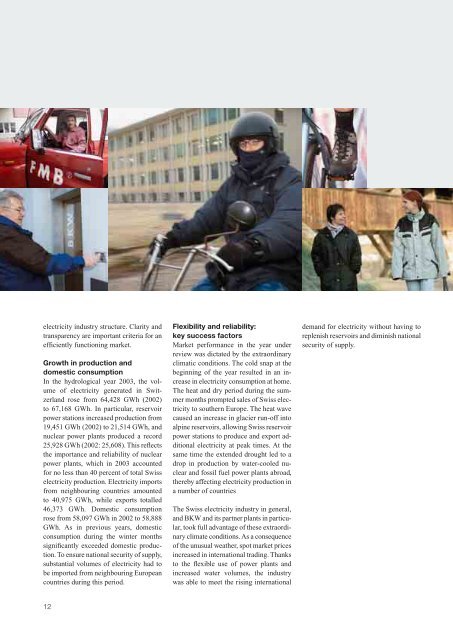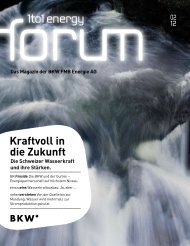BKW FMB Energy Ltd Annual Report 2003
BKW FMB Energy Ltd Annual Report 2003
BKW FMB Energy Ltd Annual Report 2003
You also want an ePaper? Increase the reach of your titles
YUMPU automatically turns print PDFs into web optimized ePapers that Google loves.
electricity industry structure. Clarity and<br />
transparency are important criteria for an<br />
effi ciently functioning market.<br />
Growth in production and<br />
domestic consumption<br />
In the hydrological year <strong>2003</strong>, the volume<br />
of electricity generated in Switzerland<br />
rose from 64,428 GWh (2002)<br />
to 67,168 GWh. In particular, reservoir<br />
power stations increased production from<br />
19,451 GWh (2002) to 21,514 GWh, and<br />
nuclear power plants produced a record<br />
25,928 GWh (2002: 25,608). This refl ects<br />
the importance and reliability of nuclear<br />
power plants, which in <strong>2003</strong> accounted<br />
for no less than 40 percent of total Swiss<br />
electricity production. Electricity imports<br />
from neighbouring countries amounted<br />
to 40,975 GWh, while exports totalled<br />
46,373 GWh. Domestic consumption<br />
rose from 58,097 GWh in 2002 to 58,888<br />
GWh. As in previous years, domestic<br />
consumption during the winter months<br />
signifi cantly exceeded domestic production.<br />
To ensure national security of supply,<br />
substantial volumes of electricity had to<br />
be imported from neighbouring European<br />
countries during this period.<br />
12<br />
Flexibility and reliability:<br />
key success factors<br />
Market performance in the year under<br />
review was dictated by the extraordinary<br />
climatic conditions. The cold snap at the<br />
beginning of the year resulted in an increase<br />
in electricity consumption at home.<br />
The heat and dry period during the summer<br />
months prompted sales of Swiss electricity<br />
to southern Europe. The heat wave<br />
caused an increase in glacier run-off into<br />
alpine reservoirs, allowing Swiss reservoir<br />
power stations to produce and export additional<br />
electricity at peak times. At the<br />
same time the extended drought led to a<br />
drop in production by water-cooled nuclear<br />
and fossil fuel power plants abroad,<br />
thereby affecting electricity production in<br />
a number of countries<br />
The Swiss electricity industry in general,<br />
and <strong>BKW</strong> and its partner plants in particular,<br />
took full advantage of these extraordinary<br />
climate conditions. As a consequence<br />
of the unusual weather, spot market prices<br />
increased in international trading. Thanks<br />
to the fl exible use of power plants and<br />
increased water volumes, the industry<br />
was able to meet the rising international<br />
demand for electricity without having to<br />
replenish reservoirs and diminish national<br />
security of supply.






![Geschäftsbericht 2002 [PDF, 0.8 MB] - BKW](https://img.yumpu.com/10617024/1/184x260/geschaftsbericht-2002-pdf-08-mb-bkw.jpg?quality=85)
![Geschäftsbericht 2001 [PDF, 0.9 MB] - BKW](https://img.yumpu.com/10616911/1/184x260/geschaftsbericht-2001-pdf-09-mb-bkw.jpg?quality=85)



![Referat Streiff 11.07.2006 [PDF] - BKW](https://img.yumpu.com/9314454/1/184x260/referat-streiff-11072006-pdf-bkw.jpg?quality=85)




